Data Integration
iOS - Apple App Store Guidelines
Follow these guidelines when submitting your app to the Apple App Store
There are 2 key sections to pay attention to:
- App Description
- App Privacy
Key Permission 1) App Description
Your app description must explain:
- Which health data you collect
- Why you collect it

Data Type Justifications
You can use this sample text to justify which Apple Health data you collect.
| Data Type | Justification |
|---|---|
| bodyTemperature | Regular monitoring of body temperature helps detect physiological responses to exercise, providing insights into how fitness activities affect overall health. |
| basalBodyTemperature | Monitoring basal body temperature allows us to track metabolic changes that can affect both fitness and sleep quality. This data helps us identify patterns related to overall health. |
| basalEnergyBurned | Measuring Basal Metabolic Rate (BMR) enables us to understand users' caloric needs at rest, which is crucial for tailoring dietary recommendations and improving fitness outcomes. |
| activeEnergyBurned | We aim to track active calories burned to analyze users' energy expenditure during physical activities. This data is essential for understanding its impact on fitness and overall health. |
| bloodGlucose | Blood glucose levels provide insights into how energy levels and physical performance are affected, helping us understand the metabolic aspects of fitness and its impact on overall health. |
| bloodPressureSystolic | Regular monitoring of blood pressure is vital for assessing cardiovascular health, allowing us to study the relationship between physical activity and heart health. |
| sleepAnalysis | Recording sleep sessions is vital for analyzing sleep patterns and quality, helping us understand how sleep affects physical health and recovery. |
| stepCount | Counting steps provides a simple yet effective measure of daily physical activity, encouraging users to move more and improve cardiovascular health and fitness. |
| flightsClimbed | Tracking floors climbed provides additional insights into the intensity of physical activity, helping us measure users' fitness levels and cardiovascular health. |
| workout | Detailed records of exercise sessions are necessary for analyzing physical activity patterns, which are crucial for understanding their impact on fitness and sleep quality. |
| heartRate | Monitoring heart rate is fundamental for understanding cardiovascular responses during exercise and rest, allowing us to assess the impact of physical activity on heart health. |
| restingHeartRate | Resting heart rate data is a key indicator of cardiovascular fitness and recovery, providing essential insights into overall fitness and health. |
| heartRateVariabilitySDNN | Heart rate variability (HRV) data is crucial for studying autonomic nervous system function and recovery, which are important for optimizing fitness programs and improving sleep quality. |
| height | Recording height is essential for accurately calculating other health metrics, such as BMI and body composition, which are vital for assessing fitness and overall health. |
| bodyMass | Regular weight monitoring is essential for tracking changes in body weight, which is important for managing weight goals and assessing overall health and fitness. |
| leanBodyMass | Tracking lean body mass provides insights into changes in muscle mass, which is important for evaluating fitness progress and overall health. |
| bodyFatPercentage | Tracking body fat percentage offers a comprehensive understanding of body composition changes, enabling us to evaluate the effectiveness of fitness programs and interventions. |
| oxygenSaturation | Monitoring oxygen saturation (SpO2) is important for assessing respiratory efficiency, which is crucial for understanding the impact of physical activity and sleep quality on overall health. |
| respiratoryRate | Monitoring respiratory rate helps us study breathing patterns, allowing us to assess the effects of fitness and sleep on respiratory health. |
| vo2Max | VO2 max data is critical for measuring aerobic fitness, helping us understand users' fitness levels and optimize their training programs for improved health outcomes. |
Include Scientific Citations for Users
Sahha scores, biomarkers, and insights are grounded in scientific research. To comply with medical app guidelines, apps must provide users with accessible citations and sources for the health scores presented. We recommend displaying the following links within your app for transparency and compliance:
- Activity Score : How the Activity Score Works - App Submission
- Sleep Score : How the Sleep Score Works - App Submission
Key Permission 2) App Privacy
Your app privacy section must explain:
- Which health data you collect
- Why you collect it
Navigate to Your App > App Privacy
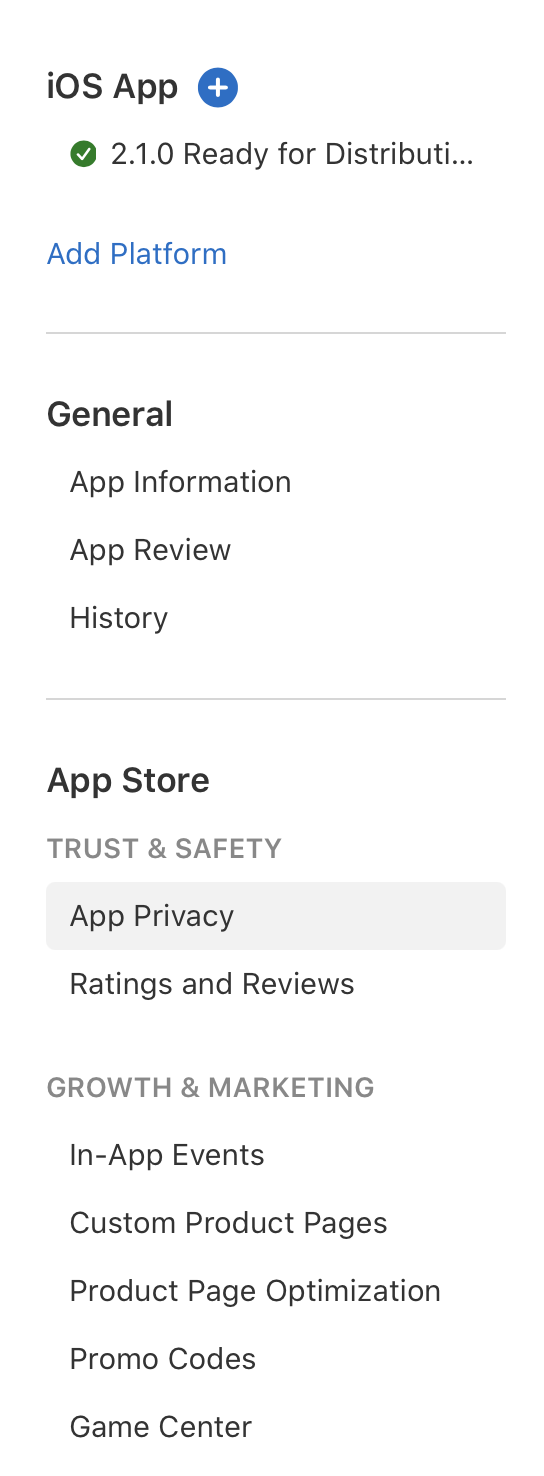
Privacy Policy
You may reference the Sahha End User Privacy in your app submission. This details how we collect and handle your user data.
Data Collection
Next, select all of the data that you or your third-party partners collect from this app. If your app is currently available on the App Store, make sure your responses reflect the data collected only from that app version.
Optional Disclosure
Data types that meet all of the following criteria are optional to disclose:
The data is not used for tracking purposes (meaning the data is not linked with other third-party data about the user or device for advertising or advertising measurement, or shared with a data broker). For more detail, see App privacy details on the App Store. The data is not used for Third-Party Advertising, your Advertising or Marketing purposes, or for Other Purposes, as those terms are defined in App privacy details on the App Store. Collection of the data occurs only in infrequent cases that are not part of your app’s primary functionality, and which are optional for the user. As part of the interface in your app where the user provides the data to be collected, such data must be transparent to the user at the time of collection, the user’s name or account name must be prominently displayed in the submission form alongside the other data elements being submitted, and the user must affirmatively choose each time to provide the data for collection. If a data type collected by your app meets some, but not all, of the above criteria, it must be disclosed in your privacy section.
Examples of data that may not need to be disclosed include data collected in optional feedback forms or customer service requests that are unrelated to the primary purpose of the app and meet the other criteria above.
For the purpose of clarity, data collected on an ongoing basis after an initial request for permission must be disclosed.
Health Research Disclosure
Data types that are collected as part of a health research study and where the data collected meets all of the following criteria are optional to disclose:
The data is collected by an entity whose collection of the data is subject to an informed consent form as part of a health research study that has been reviewed and approved by an institutional review board or ethics review board. All such data collection must follow the relevant App Store Guidelines and the data may not be used for tracking purposes as defined in App privacy details on the App Store. If the data type collected by your app meets some, but not all, of the above criteria, it must be disclosed in your privacy section.
Select the following categories for Data Not Linked to You
- Health
- Fitness
- User ID
- Product Interaction
- Crash Data
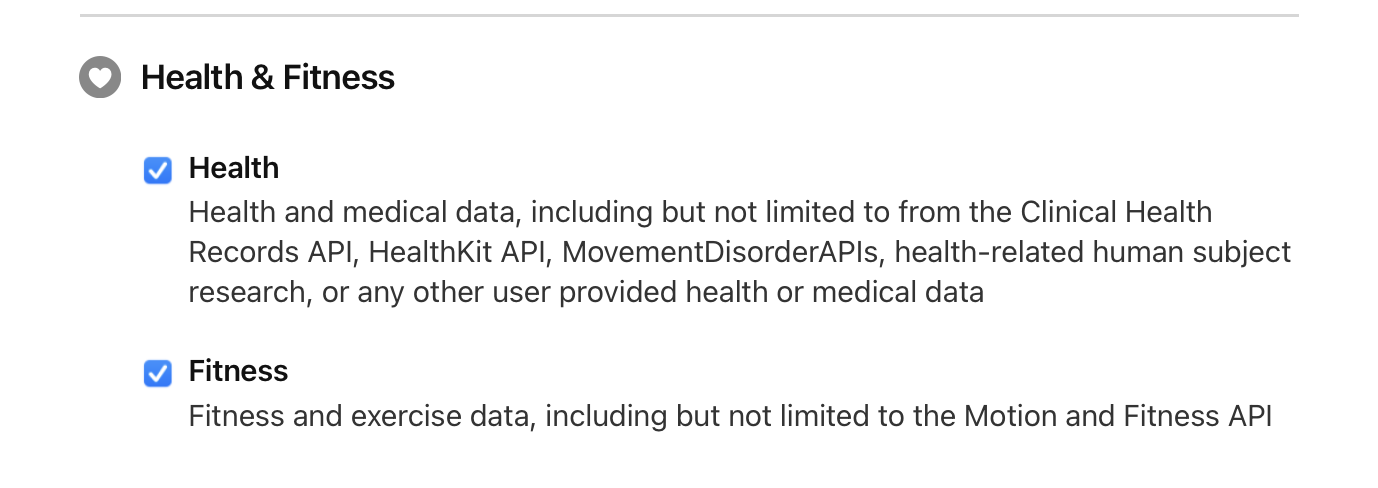
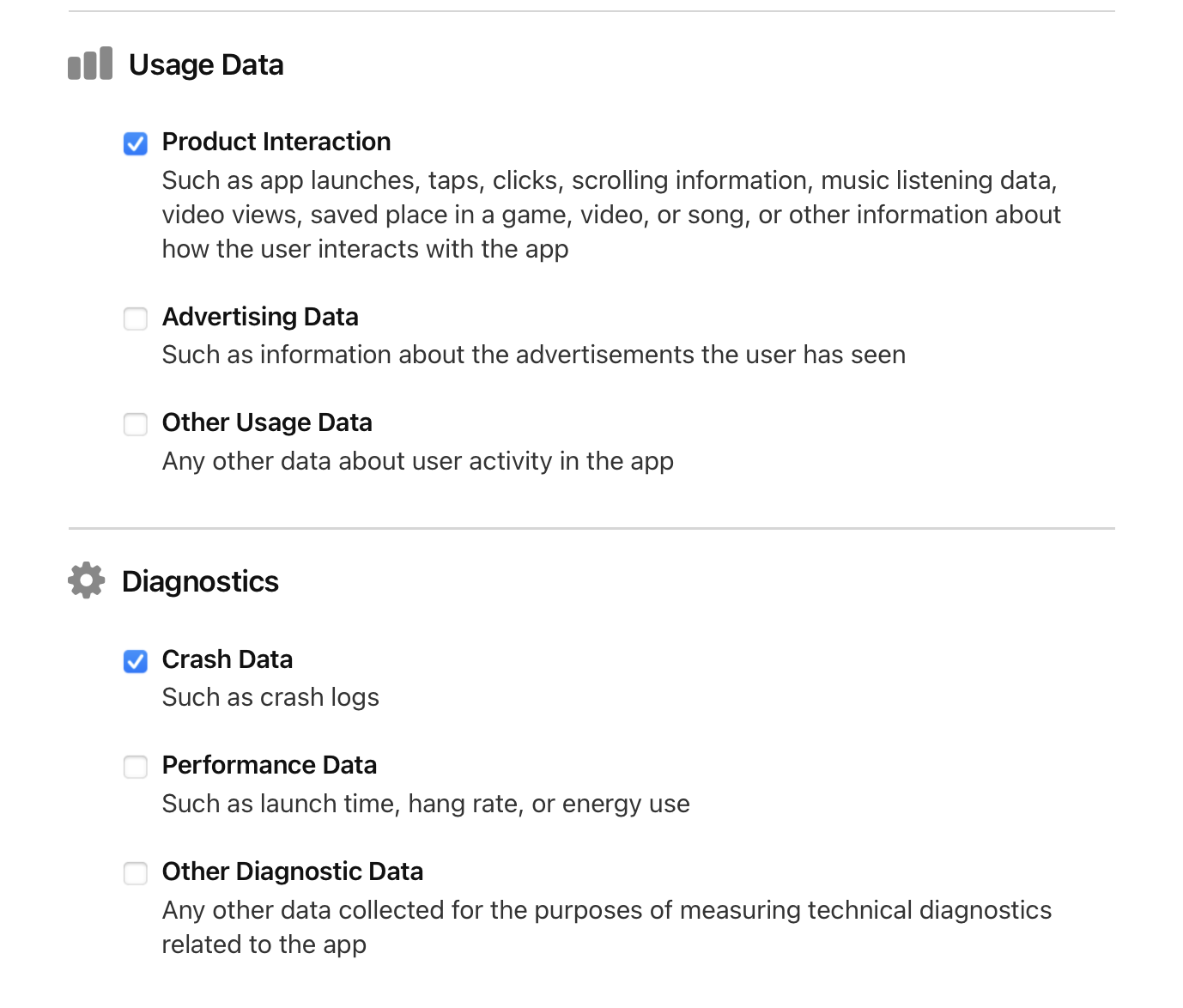
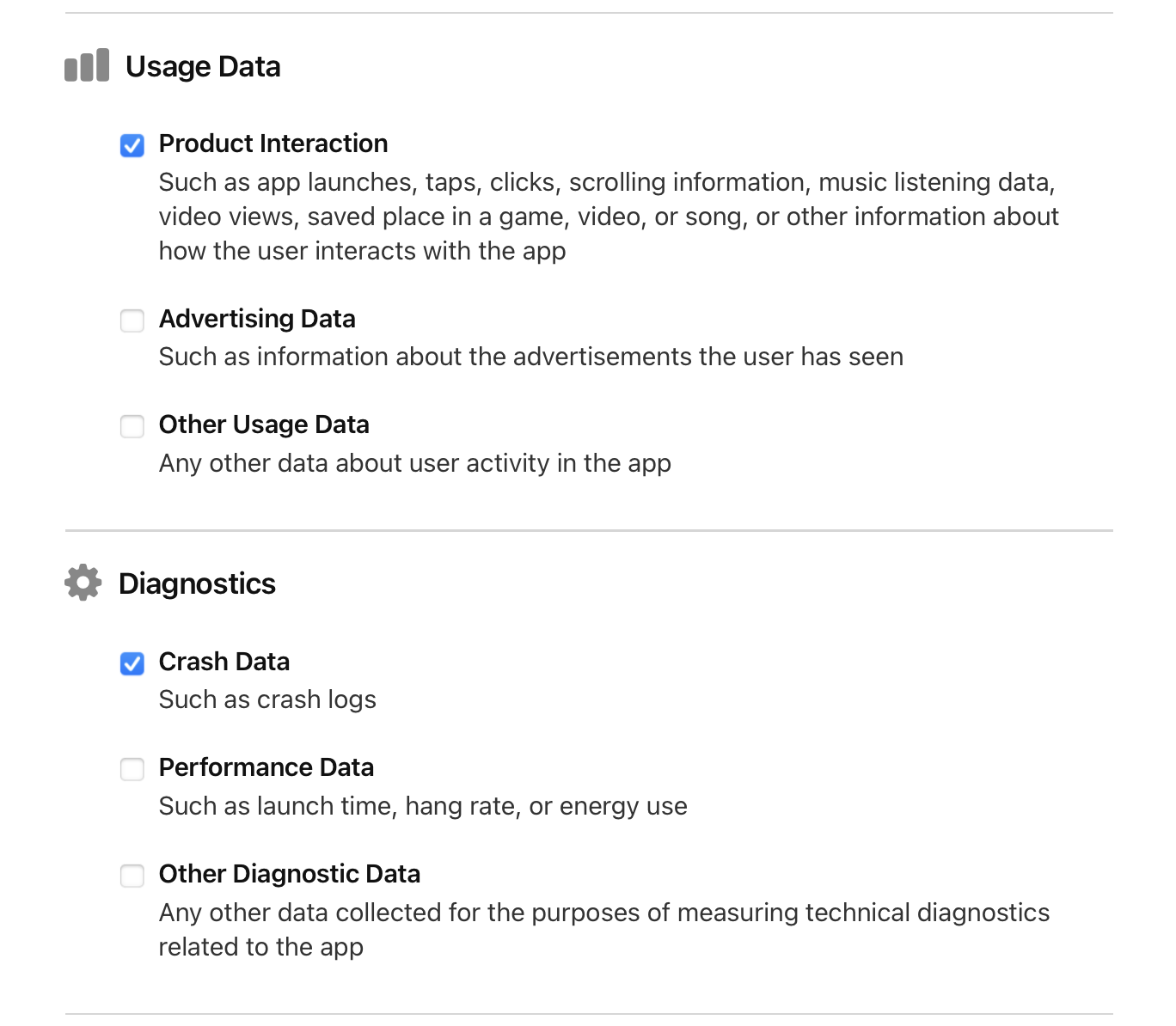
Your App Privacy page should look similar to this:
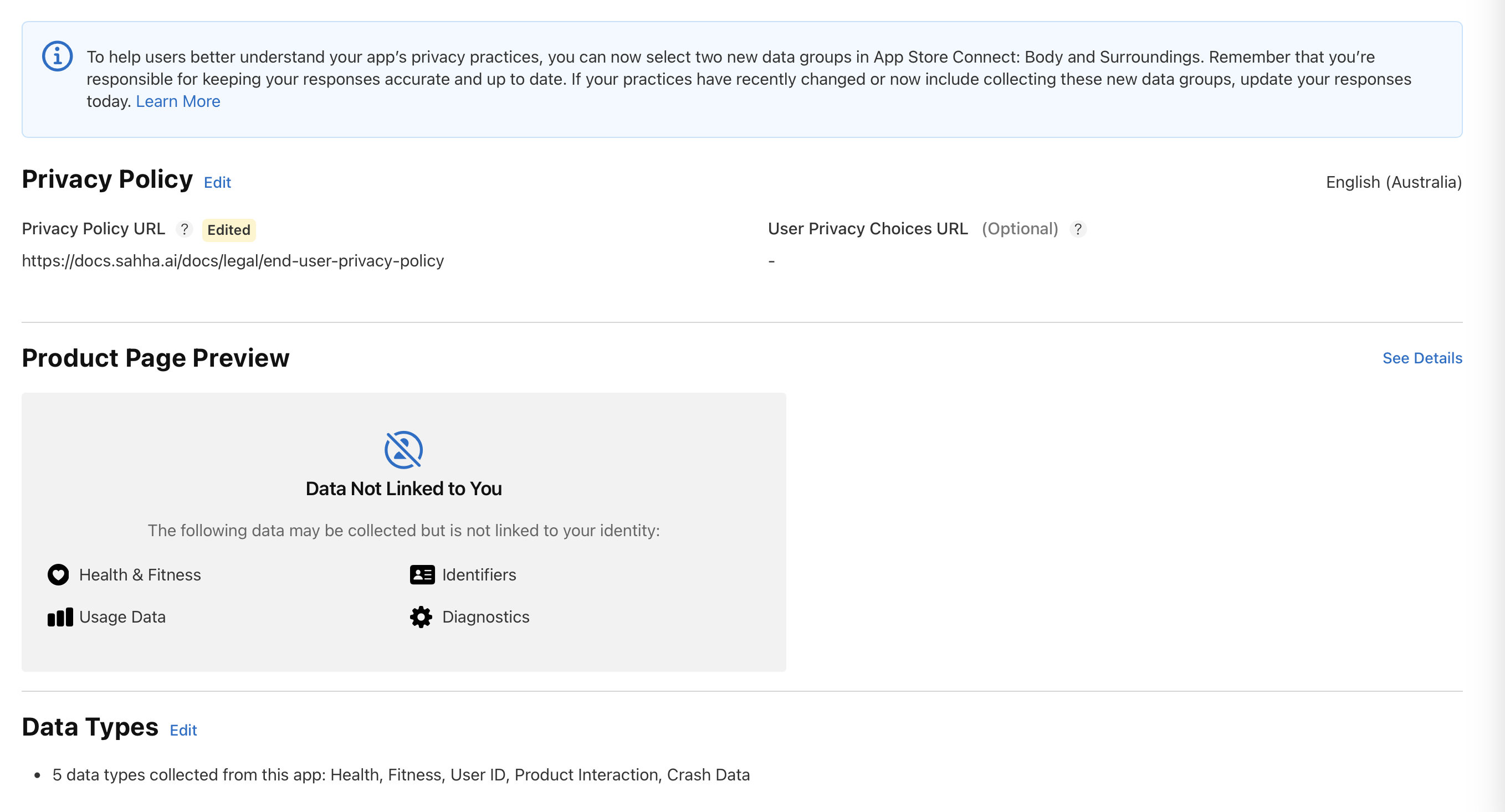
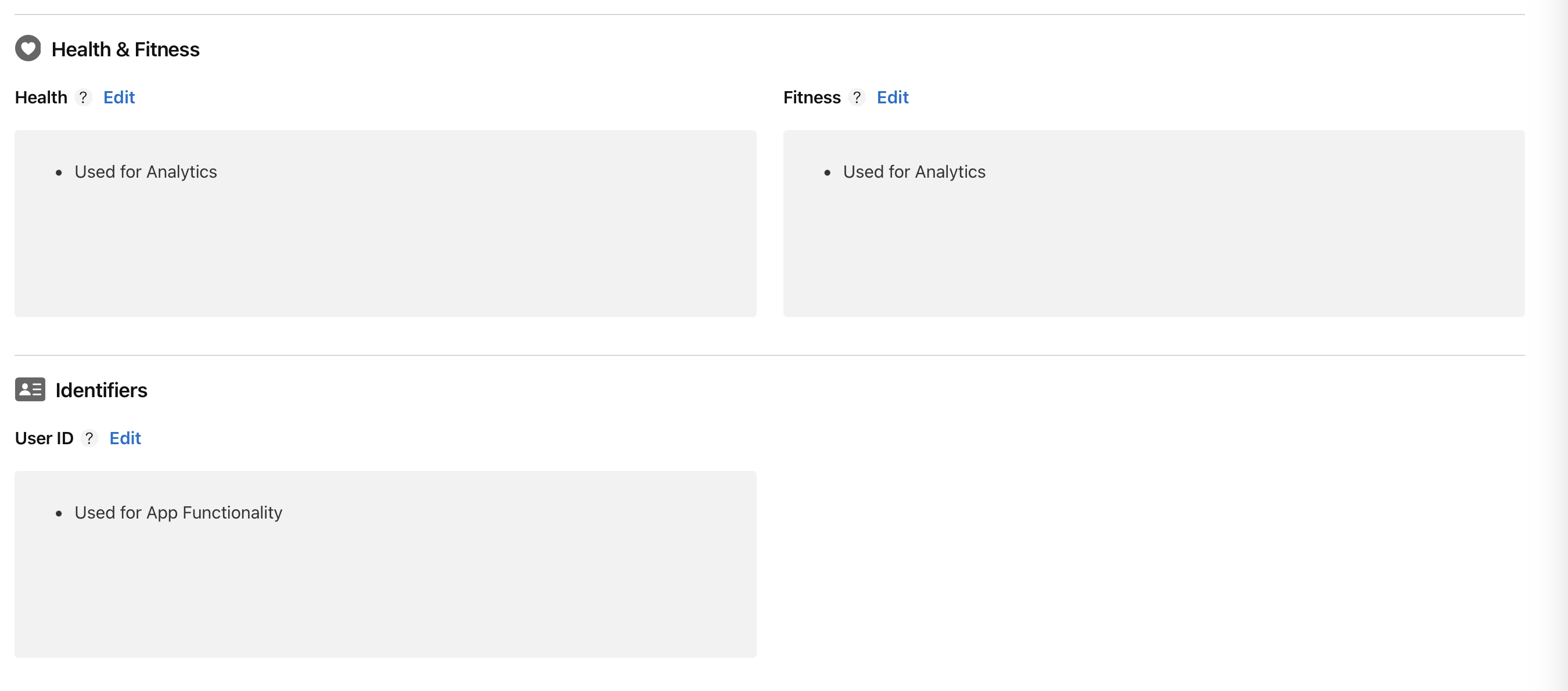
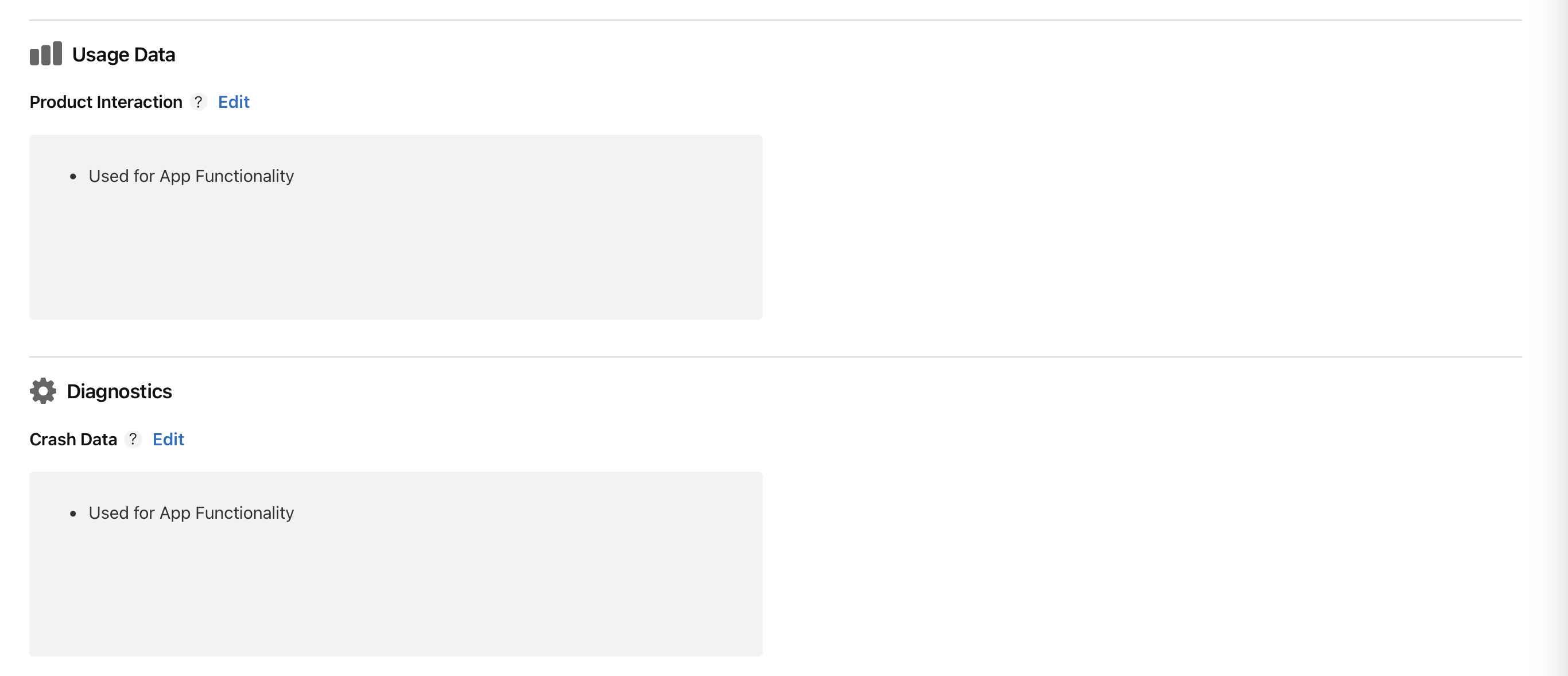
Publish your changes
If you remove data types and click “Publish,” your product page will be immediately updated.
If you select new data types, you'll need to finish setting them up on the following screen before publishing.
Review Process Timeline
Please keep in mind this review process may take up to 7 business days.
Apple may request changes to your app submission before approval. Please reach out to us if this happens so that we may support your submission.